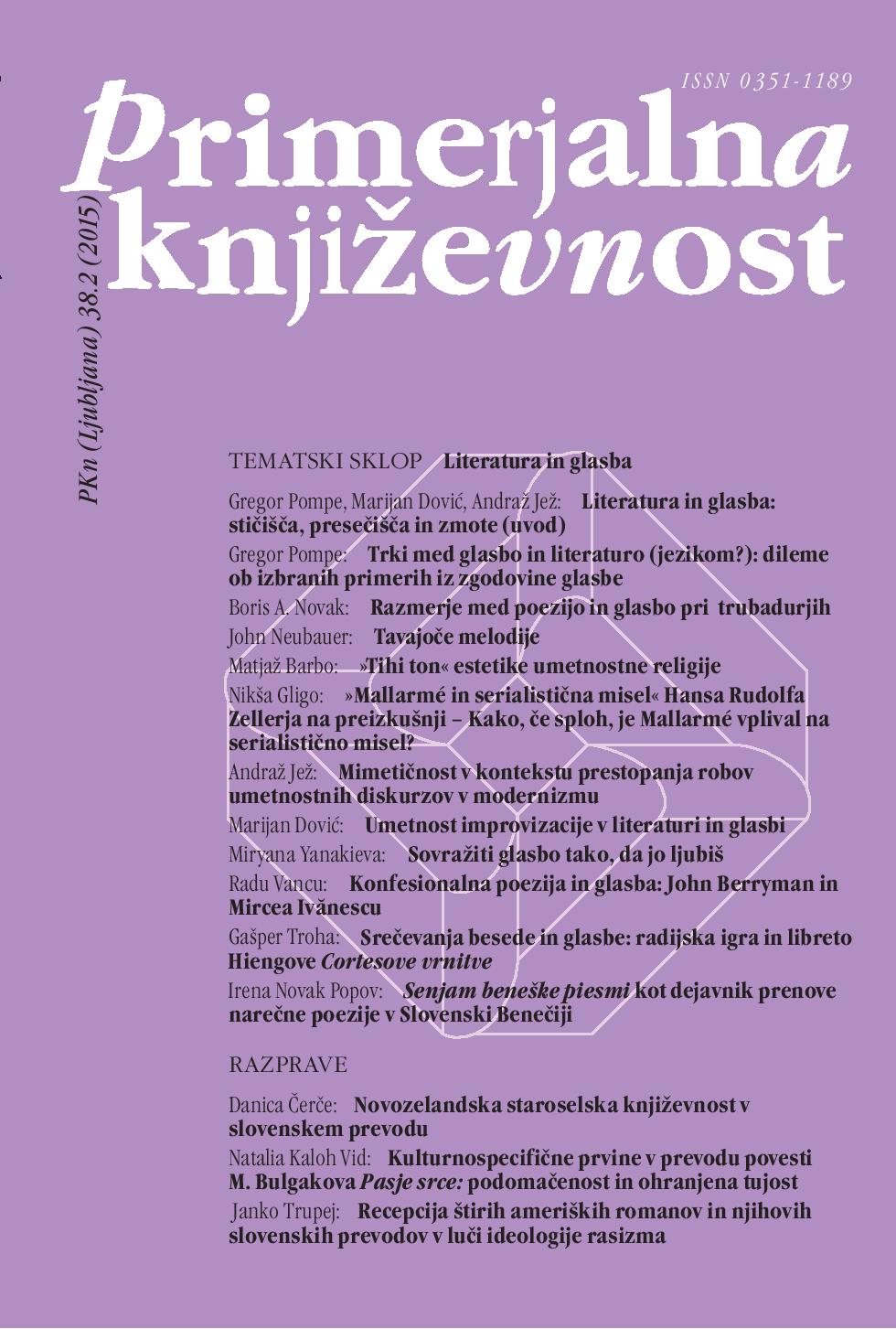Junctions of Literature and Music: Radio Play and Libretto The Return of Cortes by Andrej Hieng
Keywords:
literature and music, Slovene drama, existentialism, radio plays, Hieng, Andrej, Cortesova vrnitev, music adaptations, opera, libretto, Šivic, PavelAbstract
The Return of Cortes (1967) is a radio play by Andrej Hieng, a renowned Slovene dramatist from the 1960s and 1970s. It has had a wide resonance in the former Yugoslavia and has won several prizes. Seven years after its premiere on the Radio Slovenia a composer Pavel Šivic has rewritten it into an opera libretto. His opera is today considered to be one of the best operatic works in Slovenian music literature after the World War II. – Although all musicological analyses of the opera detect several changes in the rewritten text, they all ascribe them to the fact that Šivic had to make it suitable for the stage. However, a comparative analysis shows that the nature of these changes is far more significant. Hieng’s original text represents a genre of existentialist drama that stems from an awareness of metaphysical nihilism; the opera libretto on the other hand repeatedly tries to restore the catholic religious system and thus bring it back to the form of traditional drama as was described by Gustav Freytag in his Die Technik des Dramas. As the original text belongs to a different genre it seems to be failing again and again. – The article further examines the reasons for this tendency in the opera libretto, and by using some of the theses by Theodor W. Adorno in his Burgeois Opera shows that it is actually a result of the basic features of the operatic genre. The conclusion that needs to be further verified is that modernistic dramatic texts of the 20th and 21st Century that are based on an awareness of metaphysical nihilism cannot be convincingly rewritten as opera libretti. It seems that people singing on stage demand a certain degree of phantasy. The latter is inevitably added to the disenchanted modern world or “empirical reality” as Adorno puts it, which means that it can no longer function in its original genre. Is thus a modern opera somehow condemned to traditional texts with some elements of a fairy tale and can experiment only in the field of musical narration?References
Adorno, Theodor W. »Bourgeois Opera.« Opera Through Other Eyes. Ur. David J. Levin. Stanford, California: Stanford University Press, 1993. 25−43.
Freytag, Gustav. Tehnika drame. Ljubljana: MGL, 1976.
Hieng, Andrej. Cortesova vrnitev. Maribor: Obzorja, 1969.
Jan, Aleš. »Keeping Pace with the Time.« On the Airwaves. Ur. Pavel Lužan in Goran Schmidt. Ljubljana: Društvo slovenskih pisateljev, 2006. 7−14.
Koter, Darja. Slovenska glasba 1918–1991. Ljubljana: Študentska založba, 2013. Zbirka eBeletrina. E-knjiga.
Lužan, Pavel in Goran Schmidt (ur.). On the Airwaves. Ljubljana: Društvo slovenskih pisateljev, 2006. Litterae slovenicae 108−109.
Mihelčič, Pavel. »Beseda za operni oder.« Pavel Šivic. Cortesova vrnitev. Ljubljana: Društvo slovenskih skladateljev, 2001. Zvočni CD – spremna knjižica. 9–10.
Poniž, Denis. »Dramatika.« Slovenska književnost III. Jože Pogačnik et al. Ljubljana: DZS, 2001. 203−349.
Searby, Michael. »Ligeti’s Le Grand Macabre: How He Solved the Problem of Writing a Modernist Opera.« Tempo 66.262 (2012): 29–38.
Smrekar, Borut. »Šivičev opus za glasbeno gledališče – (opera).« Pavel Šivic (1908-1995): tematska publikacija Glasbeno-pedagoškega zbornika Akademije za glasbo v Ljubljani. Ur. Darja Koter. Ljubljana: Akademija za glasbo, 2009. 153−164.
Šivic, Pavel. Cortesova vrnitev. Ljubljana: Društvo slovenskih skladateljev, 2001. Zvočni CD.
Troha, Gašper. »Eksistencialistična drama.« Jezik in slovstvo 51.2 (2006): 53−68.
– – –. »Zgodovinska drama na Slovenskem in njena družbena vloga pod komunizmom.« Primerjalna književnost 30. Posebna številka (2007): 91−100.


